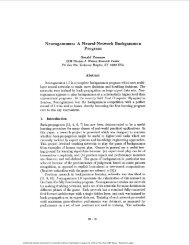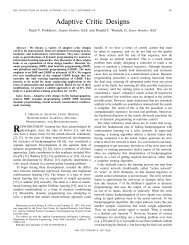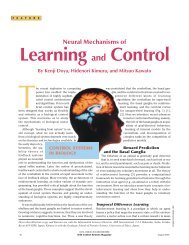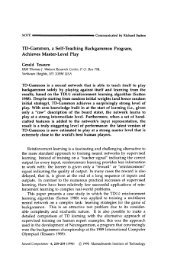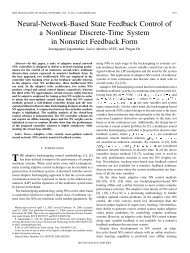Optimal Tracking Control for a Class of Nonlinear Discrete-Time ...
Optimal Tracking Control for a Class of Nonlinear Discrete-Time ...
Optimal Tracking Control for a Class of Nonlinear Discrete-Time ...
You also want an ePaper? Increase the reach of your titles
YUMPU automatically turns print PDFs into web optimized ePapers that Google loves.
1862 IEEE TRANSACTIONS ON NEURAL NETWORKS, VOL. 22, NO. 12, DECEMBER 2011[43] A. Al-Tamimi, M. Abu-Khalaf, and F. L. Lewis, “Adaptive critic designs<strong>for</strong> discrete-time zero-sum games with application to H ∞ control,”IEEE Trans. Syst., Man, Cybern., Part B: Cybern., vol. 37, no. 1, pp.240–247, Feb. 2007.[44] Q. L. Wei, H. G. Zhang, D. R. Liu, and Y. Zhao, “An optimal controlscheme <strong>for</strong> a class <strong>of</strong> discrete-time nonlinear systems with time delaysusing adaptive dynamic programming,” ACTA Autom. Sin., vol. 36,no. 1, pp. 121–129, Jan. 2010.[45] R. Beard, “Improving the closed-loop per<strong>for</strong>mance <strong>of</strong> nonlinearsystems,” Ph.D. dissertation, Dept. Electr. Eng., Rensselaer PolytechnicInst., Troy, NY, 1995.[46] D. H. Chyung, “<strong>Discrete</strong> optimal systems with time delay,” IEEE Trans.Autom. <strong>Control</strong>, vol. 13, no. 1, pp. 1–117, Feb. 1968.[47] D. H. Chyung, “<strong>Discrete</strong> systems with time delay,” presented at the 5thAnnual Allerton Conference on Circuit and System Theory, Urbana,IL, Oct. 1967.[48] D. H. Chyung and E. B. Lee, “Linear optimal systems with timedelays,” SIAM J. <strong>Control</strong>, vol. 4, no. 3, pp. 548–575, Nov. 1966.[49] P. Yang, G. Xie, and L. Wang. <strong>Control</strong>lability <strong>of</strong> Linear <strong>Discrete</strong>-<strong>Time</strong>Systems with <strong>Time</strong>-Delay in State and <strong>Control</strong> [Online]. Available:http://dean.pku.edu.cn/bksky/1999tzlwj/4.pdf[50] V. N. Phat, “<strong>Control</strong>lability <strong>of</strong> discrete-time systems with multipledelays on controls and states,” Int. J. <strong>Control</strong>, vol. 49, no. 5, pp.1645–1654, 1989.[51] C. T. Chen, Linear System Theory and Design, 3rd ed. New York:Ox<strong>for</strong>d Univ. Press, 1999.[52] D. Wang, D. R. Liu, and Q. L. Wei, “Finite-horizon neuro-optimal trackingcontrol <strong>for</strong> a class <strong>of</strong> discrete-time nonlinear systems using adaptivedynamic programming approach,” Neurocomputing, to be published.[53] X. Liao, L. Wang, and P. Yu, Stability <strong>of</strong> Dynamical Systems.Amsterdam, The Netherlands: Elsevier, 2007.[54] A. Al-Tamimi and F. L. Lewis, “<strong>Discrete</strong>-time nonlinear HJB solutionusing approximate dynamic programming: Convergence pro<strong>of</strong>,” in Proc.IEEE Int. Symp. Approx. Dyn. Program. Rein<strong>for</strong>ce. Learn., Honolulu,HI, Apr. 2007, pp. 38–43.Huaguang Zhang (SM’04) received the B.S. andM.S. degrees in control engineering from the NortheastDianli University <strong>of</strong> China, Jilin City, China, in1982 and 1985, respectively, and the Ph.D. degreein thermal power engineering and automation fromSoutheast University, Nanjing, China, in 1991.He joined the Department <strong>of</strong> Automatic <strong>Control</strong>,Northeastern University, Shenyang, China, in 1992,as a Post-Doctoral Fellow <strong>for</strong> two years. Since 1994,he has been a Pr<strong>of</strong>essor and Head <strong>of</strong> the Institute <strong>of</strong>Electric Automation, School <strong>of</strong> In<strong>for</strong>mation Scienceand Engineering, Northeastern University. He has authored and co-authoredover 200 journal and conference papers, four monographs, and co-inventedon 20 patents. His current research interests include fuzzy controls, stochasticsystem controls, neural networks-based controls, nonlinear controls, and theirapplications.Dr. Zhang is an Associate Editor <strong>of</strong> Automatica, the IEEE TRANSACTIONSON FUZZY SYSTEMS, the IEEE TRANSACTIONS ON SYSTEMS,MAN, ANDCYBERNETICS—PART B, and Neurocomputing. He was awarded the OutstandingYouth Science Foundation Award from the National Natural ScienceFoundation Committee <strong>of</strong> China in 2003. He was named the Cheung KongScholar by the Education Ministry <strong>of</strong> China in 2005.Ruizhuo Song (M’11) has been pursuing the Ph.D.degree with Northeastern University, Shenyang,China, since 2008.Her current research interests include neuralnetworks-basedcontrols, non-linear controls, fuzzycontrols, adaptive dynamic programming, and theirindustrial applications.Qinglai Wei (M’11) received the B.S. degree inautomation, the M.S. degree in control theory andcontrol engineering, and the Ph.D. degree in controltheory and control engineering from NortheasternUniversity, Shenyang, China, in 2002, 2005, and2008, respectively.He was a Post-Doctoral Fellow with the KeyLaboratory <strong>of</strong> Complex Systems and IntelligenceScience, Institute <strong>of</strong> Automation, Chinese Academy<strong>of</strong> Sciences, Beijing, China, from 2009 to 2011. Heis currently an Associate Researcher with the Institute<strong>of</strong> Automation. His current research interests include neural-networksbasedcontrols, nonlinear controls, adaptive dynamic programming, and theirindustrial applications.Tieyan Zhang (M’08) was born in 1962. Hereceived the Ph.D. degree in control theory andcontrol engineering from Northeastern University,Shenyang, China, in 2007.He is currently a Pr<strong>of</strong>essor and President <strong>of</strong> theShenyang Institute <strong>of</strong> Engineering, Shenyang. Hiscurrent research interests include fuzzy controls,fault diagnosis on electric power systems, and stabilityanalysis on smart grids.


